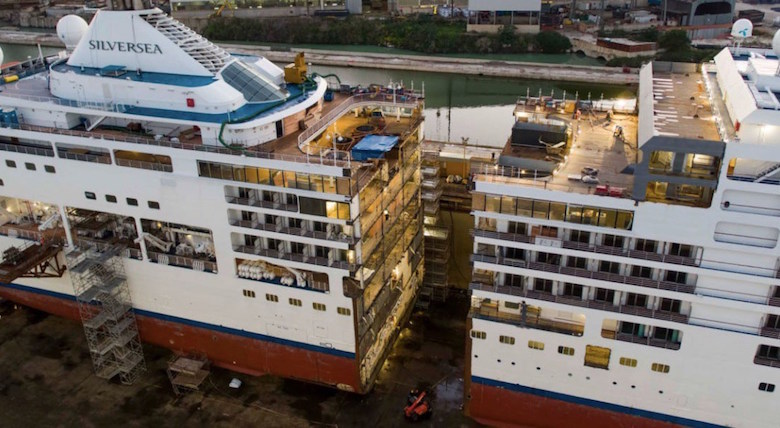I would have thought that this would be impossible. But engineers never cease to amaze me at what they can do and this particular solution boggled my mind. What they did was slice the ship in two and insert a new piece to extend it, like one would insert a leaf into a dining table to accommodate more people.
Incredible.


Welded steel is as strong as the original steel, more or less. It’s hard to wrap one’s brain around that for me.
One would not do that with a military ship. They’re designed for more exacting performance. But (if I understand correctly) the issue is not length, it’s height above the water-line -- deeper in the water is slower, taller is more likely to roll if it takes on water from a shot hole. Cruise ships are not expected to maneuver hard or go into heavy weather. BYW a friend once told me that a destroyer in a cyclone is about the worst ride known to man -- and then he said “aircraft carriers are not so hot either.” I suppose cruise ships flat out woukd not exist were it not for satellite weather analysis.
They have added length to a couple submarines, too. That’s when you really check your welds.
All that just to make the swimming pool longer!
Why is it hard? Welding is just melting the pieces together. If you do it right the joint basically doesn’t exist anymore and it becomes one continuous piece.
As you undoubtedly know, New Zealand comprises two main islands. One of out inter-island ferries was similarly treated to extend its capacity. Not exactly a cruise ship though.
Mark Dowd@#3:
Why is it hard?
Grew up woodworking.
# 5 Marcus
For your next assignment, should you decide to accept, report to Portsmouth Dockyard prepared to length HMS Victory by 20m.
The man is a theoretical physicist and he says, “I would have thought that this would be impossible”? I thought theoretical physicist believed 15 impossible things a day.
So even worse for the environment.
Not if every cruise ship lengthened that way breaks in half over the ocean trenches and provides more food for hungry deep sea monsters.
I honestly thought you were going to go on to suggest joining them by putting another island in the gap. 🙂
Speaking as an engineer, what strikes about this is the need to line up the three sections with incredible control and accuracy along six axes. The article says they have a pre-built section they’re going to slide in. Easy enough with a model but things are tougher when the parts are tens of thousands of tons each. Can you imagine sliding those bits together and discovering that you’re perfect in one area but an inch off elsewhere? How do you “nudge” something that massive?
(And speaking as an electrical engineer, it’s the big scale stuff that tends to freak me out. You know, like a Dyson sphere.)
There’s a book titled The Yard which is about making an Arleigh Burke class Aegis boat. The process is very different from making an old cast iron dreadnought. It’s amazing. Also it goes some way toward explaining the expense (a cruise ship does not need to be able to have a multi-ton missile launch from right around its water-line, which has some pretty interesting action/reaction as well as weight changes)
It’s a shame we put so much ingenuity into blowing eachother up. Think how awesome cruise ships would be if they had cruise missile confetti launchers and DoD jet-powered beer volcanoes. Ok, that might get someone killed too…
This is how ships are built these days.
Check out the videos of the construction of the USS Gerald R Ford, CVN 78.
@Marcus, No.12
I think the modular process was first used to make Liberty Ships during WW II.
This method of lengthening ships has been in use for a long time. Several of the container ships that I sailed on thirty to forty years ago were lengthened using this method. It is a (comparatively) quick and cheap method to increase capacity. Because the new section is prefabricated the ship does not need to be out of service, and not earning money, for very long, typically about three weeks.
Back some thirty years ago or so, when I was living in British Columbia, the BC Ferries operation extended some of their older ferries this way. There were also a couple of cases of ferries that got expanded by adding a second car deck to them… which involved slicing the ferry lengthwise, lifting the passenger decks upwards, and then sliding in a new pre-built deck section between the lower and upper sections. They had pictures documenting the process for a while.